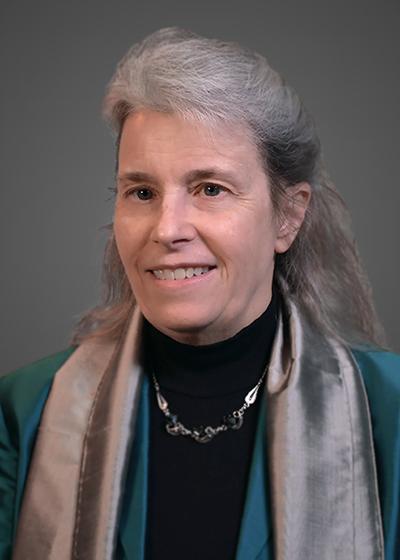Susan Trolier-McKinstry
Susan Trolier-McKinstry is an Evan Pugh University Professor and Steward S. Flaschen Professor of Ceramic Science and Engineering, and Professor of Electrical Engineering. Her main research interests include thin films for dielectric and piezoelectric applications. She directs both the Center for Dielectrics and Piezoelectrics and the Center for Three-Dimensional Ferroelectric Microelectronics. She is a member of the National Academy of Engineering, a fellow of the American Ceramic Society, IEEE, and the Materials Research Society, and an academician of the World Academy of Ceramics. She currently serves as an associate editor for Applied Physics Letters. She was 2017 President of the Materials Research Society; previously she served as president of the IEEE Ultrasonics, Ferroelectrics and Frequency Control Society, as well as Keramos.
Professor Trolier-McKinstry’s research interests are centered around structure-processing-property relationships in electroceramics. This includes work on understanding the fundamentals that control the magnitude of the dielectric and piezoelectric responses; the reliability of the materials; the processing science associated with depositing and patterning thin film electroceramics with excellent structural and composition control; and piezoelectric microelectromechanical systems (piezoMEMS).
Professor Trolier-McKinstry’s group is developing sensors and actuators that are compatible with CMOS electronics (and hence low driving voltages). Her group has approached this by trying to maximize the figure of merit for the material response through control of composition, crystallographic orientation, grain size, and changes in boundary conditions. The work includes fundamental studies on the factors that control domain wall contributions to the properties and the role of octahedral tilt in influencing response. Her group also does work on damage-free patterning of complex oxides, and fabrication of piezoelectric microelectromechanical systems, including accelerometers, pumps, switches, adaptive optics components for the next generation X-ray telescope, energy harvesters, and ultrasound systems with close-coupled electronics. They are also working on preparing high strain actuator films at low processing temperatures (< 400oC).
An additional area of research is in developing new materials for non-volatile memory. In the last decade, there have been major changes in the families of ferroelectric materials available for integration with CMOS electronics. These new materials, including Hf1-xZrxO2, Al1-xScxN, Al1-xBxN and Zn1-xMgxO, offer the possibility of new functionalities. This enables the possibility of exploiting the 3rd dimension in microelectronics for functions beyond interconnects, enabling 3D non-von Neumann computer architectures exploiting ferroelectrics for local memory, logic in memory, digital/analog computation, and neuromorphic functionality. This approach circumvents the end of Moore’s law in 2D scaling, while simultaneously overcoming the “von Neumann bottleneck” in moving instructions and data between separate logic and memory circuits. Computing accounts for 5 – 15% of worldwide energy consumption. In the U.S., data centers alone are projected to consume approximately 73 billion kWh in 2020. While recent efficiency gains in hardware have partially mitigated the rising energy consumption of computing, major gains are achievable in a paradigm shift to 3D computing systems, especially those that closely couple memory and logic.
This faculty member is associated with the Penn State Intercollege Graduate Degree Program (IGDP) in Materials Science and Engineering (MatSE) where a multitude of perspectives and cross-disciplinary collaboration within research is highly valued. Graduate students in the IGDP in MatSE may work with faculty members from across Penn State.
- Evan Pugh Professor, 2020
- National Academy of Engineering, 2019
- McMahon Lecture, Alfred University, 2019
- Greaves-Walker Role of Honor, 2019
- John Jeppson Award, 2017
- AVS Recognition for Excellence in Leadership, 2017
- IEEE Robert E. Newnham Award for Structure-Property Relations, 2016
- International Award of the Ferroelectric Materials and Their Applications, 2016
- Distinguished Lecturer of the IEEE Ultrasonics, Ferroelectrics, and Frequency Control Society, Jan. 2015 – June 2016
- US-Japan Bridgebuilder Award, 2013
- Outstanding Service Award, IEEE Ultrasonics, Ferroelectrics and Frequency Control Society, 2012
- Outstanding Educator Award – Ceramic Education Council, 2011
- Outstanding Faculty Award, Department of Materials Science and Engineering, Penn State 2009
- Faculty Mentoring Award, College of Earth and Mineral Sciences, Penn State, 2009
- Inaugural Class of National Security Science and Engineering Fellows, 2008
- IEEE Ultrasonic, Ferroelectric, and Frequency Control Society Ferroelectrics Achievement Award, 2008
- Richard M. Fulrath Award of the American Ceramic Society, 2006
- Penn State University College of Earth and Mineral Sciences Wilson Award for Excellence in Research, 2006
- Penn State University College of Earth and Mineral Sciences Wilson Award for Outstanding Teaching, 2000
- Robert L. Coble Award for Young Scholars (given by the American Ceramic Society), 2000


